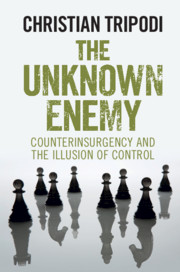Book contents
- The Unknown Enemy
- The Unknown Enemy
- Copyright page
- Dedication
- Contents
- Preface
- Acknowledgements
- 1 Culture Warriors
- 2 Themes and Issues
- 3 Knowledge, Influence and Control
- 4 ‘Peaceful Penetration’ on the North-West Frontier, 1919–39
- 5 ‘Hearts and Minds’ vs French Revolutionary War: Algeria 1954–62
- 6 Pacification in Vietnam 1964–72
- 7 Political Warfare in Iraq: Al Anbar and Basra, 2006–9
- 8 Political Warfare in Afghanistan: Helmand Province, 2006–12
- 9 Conclusion
- Bibliography
- Notes
- Index
3 - Knowledge, Influence and Control
From the Imperial Era to the Modern Day
Published online by Cambridge University Press: 06 November 2020
- The Unknown Enemy
- The Unknown Enemy
- Copyright page
- Dedication
- Contents
- Preface
- Acknowledgements
- 1 Culture Warriors
- 2 Themes and Issues
- 3 Knowledge, Influence and Control
- 4 ‘Peaceful Penetration’ on the North-West Frontier, 1919–39
- 5 ‘Hearts and Minds’ vs French Revolutionary War: Algeria 1954–62
- 6 Pacification in Vietnam 1964–72
- 7 Political Warfare in Iraq: Al Anbar and Basra, 2006–9
- 8 Political Warfare in Afghanistan: Helmand Province, 2006–12
- 9 Conclusion
- Bibliography
- Notes
- Index
Summary
The Human Terrain System. Modern population-centric COIN doctrine. The ‘Big Data’ phenomenon. All of these things reflect a similar preoccupation, namely the need to develop forms of understanding that can provide outsiders with influence and control over a resistant society or elements therein, and which allow relatively small numbers of counterinsurgents to deliver ‘stability’. Yet despite the modern terminology and the association with largely twenty-first-century conflict, these concepts are part of an intellectual trajectory that stretches from the high renaissance of European imperialism in the eighteenth and nineteenth centuries, through the Cold War to today. On the British frontier of India, in the US-controlled Philippines or in colonial French Indochina and North Africa the task was similar to that faced in Vietnam, Iraq or Afghanistan: to push into unknown territory; to generate influence and understanding there; to defeat rebellion; to fundamentally change that which already existed or to build relationships with local elements who could support one’s own political or strategic objectives. The result was (and is) a series of developments and practices that have, over time, found their expression in the form of contemporary COIN and stabilisation theory and doctrine.
Information
- Type
- Chapter
- Information
- The Unknown EnemyCounterinsurgency and the Illusion of Control, pp. 46 - 66Publisher: Cambridge University PressPrint publication year: 2020
